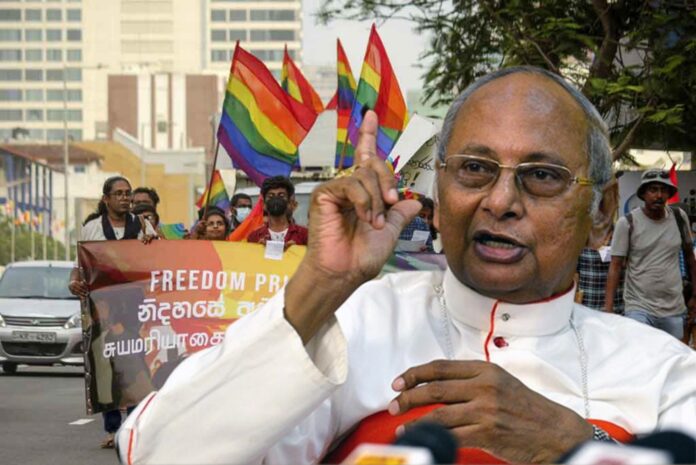By: Ovindi Vishmika
July 31, Colombo (LNW): Experts say rhetoric violates constitutional protections, fuels extremist activity, and risks incitement under Sri Lankan law
Legal experts and constitutional advocates are raising serious concerns following recent remarks by Archbishop of Colombo, Cardinal Malcolm Ranjith, in which he publicly denounced same-sex marriage as a “corrupt ideology” and questioned the validity of families formed by same-sex couples. Critics say the comments, made during a sermon at St. Anne’s Church in Beruwala, are not only socially inflammatory but legally flawed, constitutionally inconsistent, and potentially dangerous.
While the Cardinal framed his position in religious terms, legal scholars argue that his remarks amount to public discrimination,which could contribute to a hostile environment for LGBTQ+ individuals, particularly in a context where extremist groups are already mobilising against queer communities.
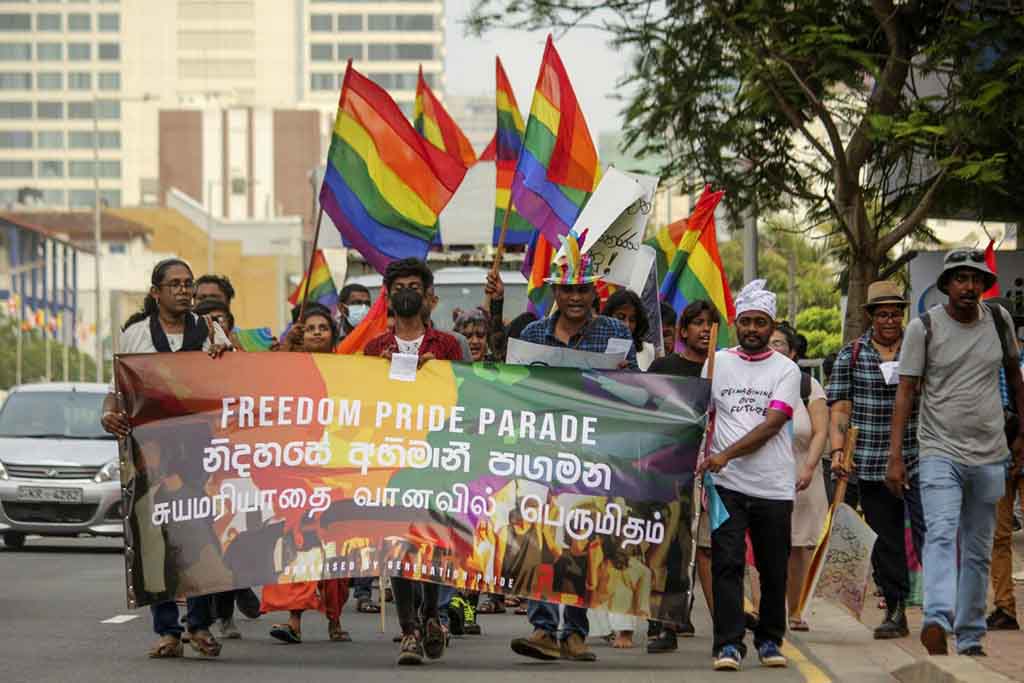
Contradiction of Supreme Court Precedent
At the center of the legal backlash is the Supreme Court’s Special Determination No. 13/2023, in which the Court determined that repealing Sections 365 and 365A of the Penal Code — colonial-era provisions criminalising same-sex sexual conduct — would not be inconsistent with the Constitution. The Court made it clear that consensual same-sex relationships between adults are protected under Sri Lanka’s constitutional framework, and any attempt to prevent their legal recognition without rational justification constitutes unjust discrimination.
In its determination, the Court rejected arguments that decriminalisation would endanger public morality, national security, or social order. The ruling emphasised that the Constitution must be interpreted in light of the values of equality, dignity, and justice, which apply to all citizens, regardless of sexual orientation.
Thus, when the Cardinal claims that same-sex marriage is a moral threat or questions the capacity of same-sex couples to raise families, he directly undermines the reasoning and authority of the Supreme Court, which has already ruled against such assertions.
Violation of Constitutional Guarantees
Legal analysts point to Article 12(1) and (2) of the Sri Lankan Constitution, which guarantees that all persons are equal before the law and prohibits discrimination on arbitrary grounds. While sexual orientation is not expressly listed, the Constitution must be read in harmony with Sri Lanka’s obligations under international human rights law, including the International Covenant on Civil and Political Rights (ICCPR), to which the country is a signatory.
Statements by a senior religious leader that marginalise or stigmatise individuals based on their sexual orientation especially when such statements are made in public forums violate the spirit of constitutional equality and non-discrimination, particularly when they are positioned as a basis for withholding legal recognition of family life.
As public law expert Dr. Ruwan Fernando notes, “Freedom of religion does not provide immunity from constitutional responsibility. When a person in a position of authority uses their platform to delegitimise the rights of a minority group already protected under law, that crosses into the realm of legal concern.”
Potential Breach of the ICCPR Act
The ICCPR Act No. 56 of 2007, which brings the international treaty into Sri Lankan domestic law, prohibits the advocacy of hatred that constitutes incitement to discrimination, hostility, or violence.Section 3 of the Act explicitly criminalises public speech or conduct that incites such hatred based on identity categories, including sexual orientation when read under Sri Lanka’s interpretive obligations.
Legal professionals argue that the Cardinal’s comments may not exist in isolation but must be interpreted within a broader context particularly as his statements are being amplified by religious extremists such as the Mawwarunge Peramuna, a far-right group reportedly aligned with evangelical networks.
Mawwarunge Peramuna and Illegal Hate Campaigns
The group,Mawwarunge Peramuna, has in recent months launched a coordinated campaign targeting LGBTQ+ individuals, using homophobic and defamatory rhetoric, including calling them “paedophiles” and “mentally ill.” Most alarmingly, the group has reportedly distributed hate propaganda within government schools, a move which potentially violates the Education Ordinance,child protection laws, and the ICCPR Act.
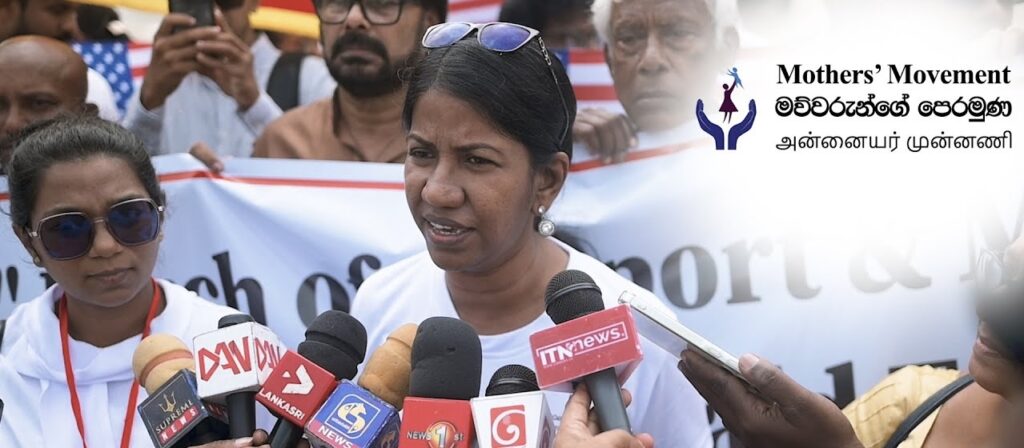
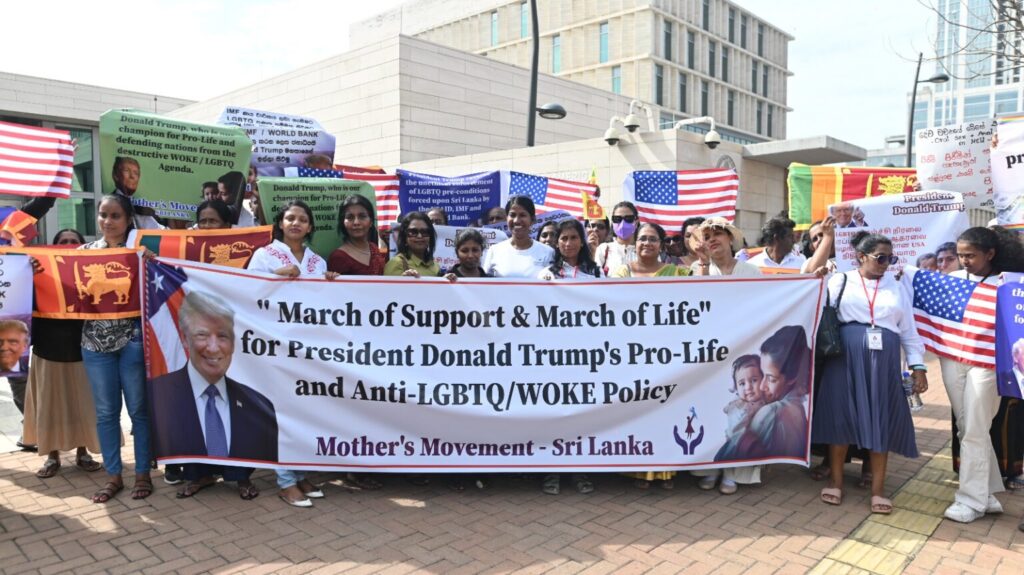
One of their pamphlets claimed that “Donald Trump is more trustworthy than the Sri Lankan Supreme Court,” directly attacking the judiciary’s legitimacy. The group has also attempted to frame same-sex relationships as a national security threat,an argument explicitly rejected by the Supreme Court.
These activities not only constitute unlawful ideological interference in public education, but may also amount to criminal incitement under the ICCPR Act, especially given their intent to dehumanise and vilify a marginalised group.
With the Cardinal’s remarks now echoing similar themes such as framing same-sex love as a social threat,legal observers warn that his words may function as legitimising rhetoric for extremist actors, thereby expanding their reach and granting moral cover to their illegal actions.
Religious Belief Does Not Justify Legal Harm
While religious freedom is protected under Article 14(1)(e) of the Constitution, it is not absolute. The Constitution does not permit public figures—religious or otherwise—to deny legal rights on the basis of private belief,particularly when the speech undermines equality or promotes social exclusion.
Legal consensus affirms that morality, whether religious or cultural,cannot override the rule of law, particularly when fundamental rights are at stake. As reiterated by the Supreme Court, “Public morality cannot be used as a justification for criminalisation or exclusion when it violates dignity, privacy, or equality.”
-A Coordinated Threat Against Human Rights
What makes the situation particularly concerning, say civil society groups, is the interplay between religious leadership and extremist movements, forming a broader ideological network aimed at stalling or reversing human rights advancements. The alignment between Cardinal Ranjith’s messaging and Mawwarunge Peramuna’s agenda is no coincidence, they argue it is part of a growing global chain of reactionary resistance targeting queer and gender-diverse people.
“This is not merely religious opinion,” said a Colombo-based constitutional rights monitor. “This is systemic exclusion masquerading as doctrine, and it is being weaponised by those who seek to impose one moral worldview on the entire country—at the expense of constitutional democracy.”
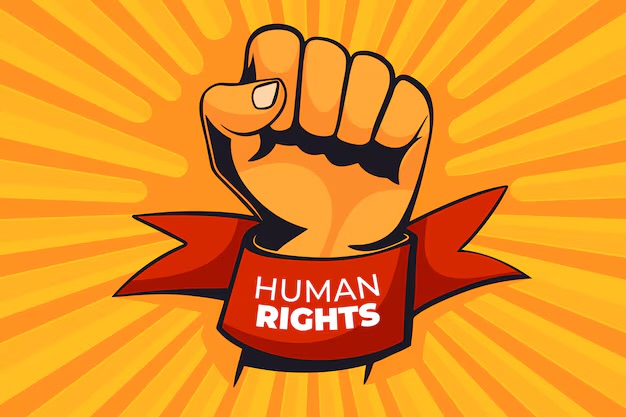
Call for Legal Accountability
In response, legal professionals and rights advocates have urged the Attorney General’s Department, the Human Rights Commission of Sri Lanka, and the Ministry of Education to launch investigations into whether the Cardinal’s statements and the actions of Mawwarunge Peramuna constitute violations of law.
They stress that parliamentary debate on LGBTQ+ rights cannot proceed in an atmosphere of fear and hostility, especially when hate is being circulated in public spaces, schools, and houses of worship.
Attorney Dharshana Weraduwage stated, “This is not just a matter of speech—it’s a matter of legal integrity. If we allow public figures to target queer people without consequence, we erode the very foundation of the Constitution.”
Law Must Prevail Over Prejudice
As Sri Lanka moves toward legislative reform in line with the Supreme Court’s directive, the government must now reckon with a growing conflict between constitutional equality and religiously framed discrimination. If left unchecked, the spread of hate rhetoric by religious and extremist actors could jeopardise not only the rights of LGBTQ+ individuals, but also the independence of the judiciary and the rule of law itself.
The law is clear: all citizens regardless of who they love are entitled to dignity, equality, and protection under the Constitution. Religious belief, however sincerely held, cannot be allowed to justify legal exclusion or public incitement.
The silence of institutions, in this moment, would not be neutrality—it would be complicity.
